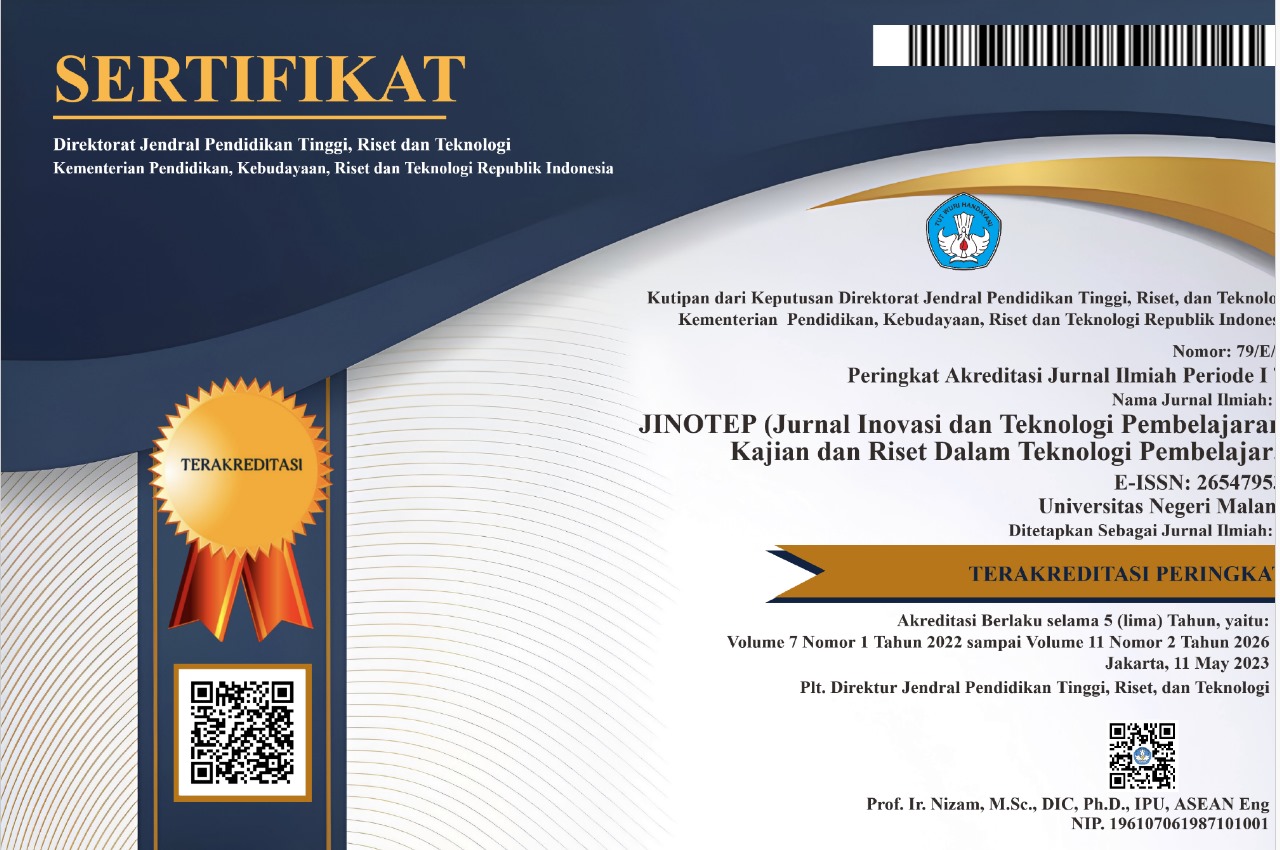Development of e-modules based on socio-scientific issues on Chemistry content
Abstract
Abstrak: Penelitian ini dilatarbelakangi oleh motivasi siswa yang rendah. Hasil belajar siswa pada materi sifat koligatif larutan juga rata-rata masih di bawah Kriteria Ketuntasan Minimal. Sumber belajar yang digunakan berupa buku ajar dan masih belum terintegrasi socio scientific issues. Penelitian ini bertujuan untuk mengetahui tingkat validitas, kepraktisan, dan efektivitas dari e-modul yang dikembangkan. Jenis penelitian ini adalah penelitian dan pengembangan (R&D) dan menggunakan model Four D. Produk yang dikembangkan berupa e-modul berbasis socio scientific issues pada materi sifat koligatif larutan. Instrumen yang digunakan pada penelitian ini adalah lembar penilaian berupa angket dan soal pilihan ganda. Analisis data yang digunakan adalah rumus momen kappa. Hasilnya menunjukkan bahwa e-modul yang dikembangkan memiliki tingkat validitas dan kepraktisan yang sangat tinggi dengan nilai k sama dengan 0,90 dan 0,92. Di samping itu, efektivitas e-modul berada pada kategori medium dengan nilai n gain sebesar 0,32. Kesimpulan dari penelitian ini adalah e-modul berbasis socio scientific issues pada materi sifat koligatif larutan telah layak dan efektif pada proses pembelajaran.
Abstract: This research is in the latter due to low student learning motivation. Student's learning results on the material of the colligative properties of the solution also the mean values were still under the Minimum Completeness Criteria. The learning resources used were in the form of textbooks and were still not integrated with socio-scientific issues. This research aims to know the scale of validity, practicality, and effectiveness of the e-modules developed. This form of study qualifies as research and development (R&D) and employs the Four D model. The product development is an e-module based on socio-scientific issues on colligative materials in solution. The instrument used in this study is an assessment sheet of the type of anxiety and the multiple-choice question. Data analysis employed the kappa moment formula. The results show that the developed and practical e-module had a very high level of validity with a value of k equal with 0.91 and 0.92. Alongside this, the effectiveness of the e-module is in the medium category, with an N-gain value of 0.32. This study concludes that the e-modules based on socio-scientific issues in the colligative properties of solutions are feasible and effective in the learning process.
Keywords
Full Text:
PDFReferences
Afrilya, N., Afrianis, N., & Nurhadi. (2022). Pengaruh penerapan pendekatan socio scientific issuesterhadap kemampuan literasi sains siswa pada materi minyak bumi. JRPK: Jurnal Riset Pendidikan Kimia, 12(1), 10–19. https://doi.org/10.21009/JRPK.121.02
Amdayani, S., Dibyantini, R., Darmana, A., & Dalimunthe, M. (2022). Development of socio-scientific issues based reaction rate module and science literacy oriented. Proceedings of the 4th International Conference on Innovation in Education, Science and Culture, ICIESC 2022, (pp. 1–6). https://doi.org/10.4108/eai.11-10-2022.2325292
Armas, A. R. K., Ramlawati, & Muhammad Syahrir. (2019). Hubungan Antara Literasi Sains Dengan Prestasi Belajar Peserta Didik Pada Pembelajaran Kimia Kelas Xi Mipa Sma Negeri Se-Kota Makassar. Chemistry Education Review (CER), 2(2), 67–75. https://doi.org/10.26858/cer.v2i2.8950
Azizah, H. P., Hafiza, N., & Ilhami, A. (2022). Pengembangan e-modul ipa smp berbasis socio scientific issues ( SSI ) : Systematic Review. Jurnal Pendidikan Indonesia, 2(4), 35-43. http://www.jurnal.penerbitwidina.com/index.php/JPI/article/view/206
Boslaugh, S., & Watters, P. A. (2008). Statistics in a nutshell. O’Reilly Media. https://doi.org/10.1080/10691898.2000.12131286
Cloonan, M. R., Cloonan, D. J., Lynn Schlitzkus, L., & Fingeret, A. L. (2020). Learners with experience in surgical scrub benefit from additional education with an interactive e-learning module. Journal of the American College of Surgeons, 231(4), e196. https://doi.org/10.1016/j.jamcollsurg.2020.08.521
Dalaila, I., Widiyaningrum, P., & Saptono, S. (2022). Developing e-module based on socio-scientific issues to improve students scientific literacy. JISE, 11(3), 292–301. http://journal.unnes.ac.id/sju/index.php/jise
Dalimunthe, M., & Ginting, R. J. (2022). Pengembangan modul berbasis problem based learning dengan pendekatan saintifik pada materi asam-basa. Jurnal Inovasi Pembelajaran Kimia, 4(2), 177–190. https://doi.org/10.24114/jipk.v4i2.38991
Desriani, Z., & Franzia, E. (2017). Peranan desain komunikasi visual dalam perancangan buku motivasi “dibesarkan oleh satu”. In Prosidding Seminar Nasional Cendekiawan, (pp. 285–290).
Fatmianeri, Y., Hidayanto, E., & Susanto, H. (2021). Pengembangan Modul Elektronik Berbasis Differentiated Instruction untuk Pembelajaran Blended Learning. Jurnal Ilmiah Pendidikan Matematika, 10(1), 50–62. http://doi.org/10.25273/jipm.v10i1.8709
Firdaus, R., & Pahlevi, T. (2022). The development of problem-based learning e-modules on correspondence materials. JINOTEP (Jurnal Inovasi Dan Teknologi Pembelajaran): Kajian Dan Riset Dalam Teknologi Pembelajaran, 9(2), 145–157. https://doi.org/10.17977/um031v9i22022p145
Genisa, M. U., Subali, B., Djukri, Agussalim, A., & Habibi, H. (2020). Socio-scientific issues implementation as science learning material. International Journal of Evaluation and Research in Education, 9(2), 311–317. https://doi.org/10.11591/ijere.v9i2.20530
Ginting, F. A., Syahputra, R. A., Purba, J., Sutiani, A., & Dibyantini, R. E. (2022). Pengembangan modul berbasis discovery learning terintegrasi literasi sains pada materi laju reaksi. Jurnal Inovasi Pembelajaran Kimia, 4(2), 167–176. https://doi.org/10.24114/jipk.v4i2.35671
Kementerian Pendidikan dan Kebudayaan. (2017). Materi pendukung literasi sains.
Khalid, L., Bucheerei, J., & Issah, M. (2021). Pre-Service teachers’ perceptions of barriers to promoting critical thinking skills in the classroom. SAGE, 11(3), 1–9. https://doi.org/10.1177/21582440211036094
Laili, I., Ganefri, & Usmeldi. (2019). Efektivitas Pengembangan e-modul project based learning pada mata pelajaran instalasi. Jurnal Imiah Pendidikan Dan Pembelajaran, 3(3), 306–315. https://ejournal.undiksha.ac.id/index.php/JIPP/article/download/21840/13513
Mudawamah, K. (2020). Peningkatan hasil belajar dan literasi sains siswa smpn 1 ngoro mojokerto melalui penerapan pendekatan saintifik berbasis socio-scientific issues (SSI). Science Education and Application Journal, 2(2), 52. https://doi.org/10.30736/seaj.v2i2.254
Novitasari, R., Waluyo, J., & Jember, U. (2022). Chemistry e-module based on socio scientific issues (SSI) for reaction rate material to increase senior high school students’ chemical literacy. Eduvest, 2(9), 1811–1816. https://doi.org/10.59188/eduvest.v2i9.588
Nurmilawati, S., Agung, S., & Murniati, D. (2021). Identifikasi Pengetahuan dan kompetensi sains siswa berdasarkan socio-scientific issues (ssi) pada materi sistem koloid. Jurnal Riset Pendidikan Kimia, 11(1), 11–24. http://journal.unj.ac.id/unj/index.php/jrpk/article/view/3067
Purwati, R., Suranto, Sajidan, & Prasetyanti, N. M. (2019). Problem-based learning modules with socio-scientific issues topics to closing the gap in argumentation skills. TOJET: The Turkish Online Journal of Educational Technology, 18(4), 35–45. https://eric.ed.gov/?id=EJ1232267
Ramdhani, E. P., Khoirunnisa, F., & Siregar, N. A. N. (2020). Efektifitas modul elektronik terintegrasi multiple representation pada materi ikatan kimia. Journal of Research and Technology, 6(1), 162–167. https://journal.unusida.ac.id/index.php/jrt/article/view/152
Sadler, T. D., & Zeidler, D. L. (2004). The morality of socioscientific issues: construal and resolution of genetic engineering dilemmas. Science Education, 88(1), 4–27. https://doi.org/10.1002/sce.10101
Seruni, R., Munawaoh, S., Kurniadewi, F., & Nurjayadi, M. (2019). Pengembangan modul elektronik (e-module) biokimia pada materi metabolisme lipid menggunakan flip pdf professional. JTK (Jurnal Tadris Kimiya), 4(1), 48–56. https://doi.org/10.15575/jtk.v4i1.4672
Setyaningsih, A., Rahayu, S., Fajaroh, F., & Parmin, P. (2019). Pengaruh pembelajaran process oriented-guided inquiry learning berkonteks isu-isu sosiosaintifik dalam pembelajaran asam basa terhadap keterampilan berargumentasi siswa SMA kelas XI. Jurnal Inovasi Pendidikan IPA, 5(2), 168–179. https://doi.org/10.21831/jipi.v5i2.20693
Suastrawan, K. E., Suardana, I. N., & Sudiatmika, A. A. I. A. R. (2021). The effectiveness of science e-modules for class vii junior high schools based on socioscientific issues to improve students’ critical thinking skills. Journal of Science Education Research, 5(2), 1–9. https://doi.org/10.21831/jser.v5i2.42877
Sukmanasa, E., Windiyani, T., & Novita, L. (2017). Pengembangan media pembelajaran komik digital pada mata pelajran ilmu pengetahuan sosial bagi siswa kelas v sekolah dasar di kota bogor. Jurnal Pendidikan Sekolah Dasar, 3(2), 171–185. http://dx.doi.org/10.30870/jpsd.v3i2.2138
Sumarmi, Bachri, S., Irawan, L. Y., & Aliman, M. (2021). E-module in blended learning: its impact on students’ disaster preparedness and innovation in developing learning media. International Journal of Instruction, 14(4), 187–208. https://doi.org/10.29333/iji.2021.14412a
Ulfah, A., & Jumaiyah, D. (2018). Pengembangan bahan ajar mata kuliah bahasa indonesia di perguruan tinggi kabupaten lamongan. Jurnal Inovasi Pendidikan, 2(1), 75–81. http://jim.unisma.ac.id/index.php/fkip/article/view/1730
Warastuti, T. M., Baedhowi, & Susilaningsih. (2017). Pengembangan bahan ajar dengan model kontekstual untuk pembelajaran ekonomi. In Prosidding Seminar Pendidikan Ekonomi dan Bisnis (Vol. 3 No. 1).
Zeidler, D. L., Sadler, T. D., Simmons, M. L., & Howes, E. V. (2005). Beyond STS: A research-based framework for socioscientific issues. Science Education. https://doi.org/10.1002/sce.20048
DOI: http://dx.doi.org/10.17977/um031v10i22023p129
Refbacks
- There are currently no refbacks.
Copyright (c) 2023 Fransiska Putri Sonia Ndruru, Susilawati Amdayani

This work is licensed under a Creative Commons Attribution-ShareAlike 4.0 International License.
======================================================================
Jurnal Inovasi dan Teknologi Pembelajaran published by Universitas Negeri Malang in collaboration with the Asosiasi Program Studi Teknologi Pendidikan Indonesia (APS TPI) and Ikatan Profesi Teknologi Pendidikan Indonesia (IPTPI) with a MoU.
Publisher Address:
Educational Technology Laboratorium, Building D5, 1st Floor
Faculty of Education, Universitas Negeri Malang
Semarang St. No. 5, Malang City, East Java Province, Postal Code 65145
Email: jinotep.fip@um.ac.id
======================================================================

JINOTEP is licensed under a Creative Commons Attribution-ShareAlike 4.0 International License.
JINOTEP Statistics (Since July 13th, 2020)



.png)




.png)
1.png)
1.png)
4.png)
2.png)
1.png)
1.png)
.png)


_3.png)





1.png)
.png)